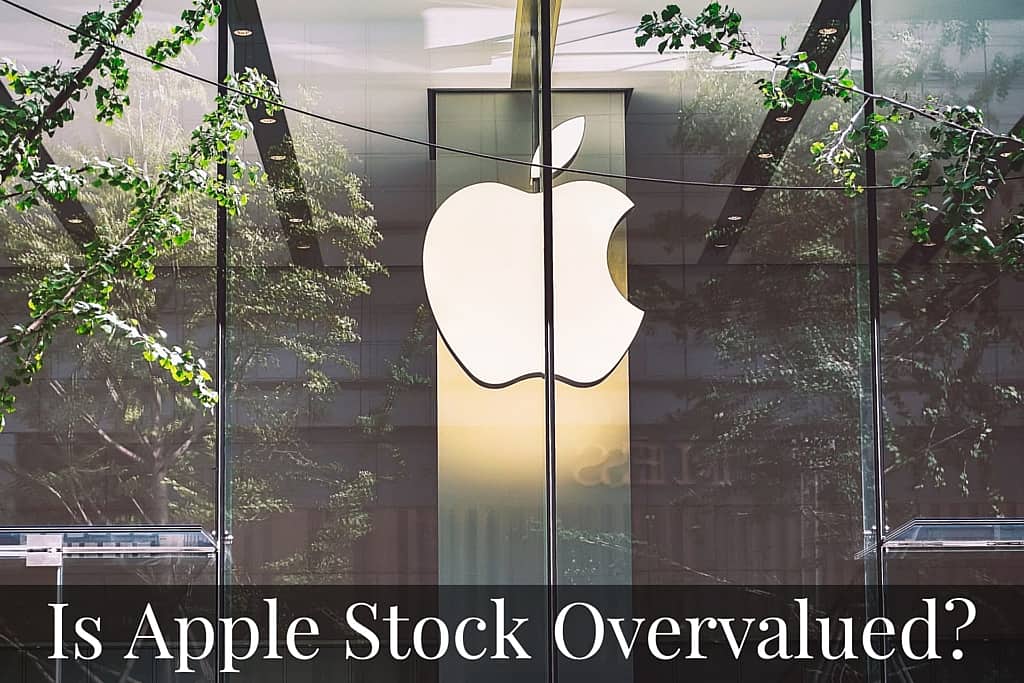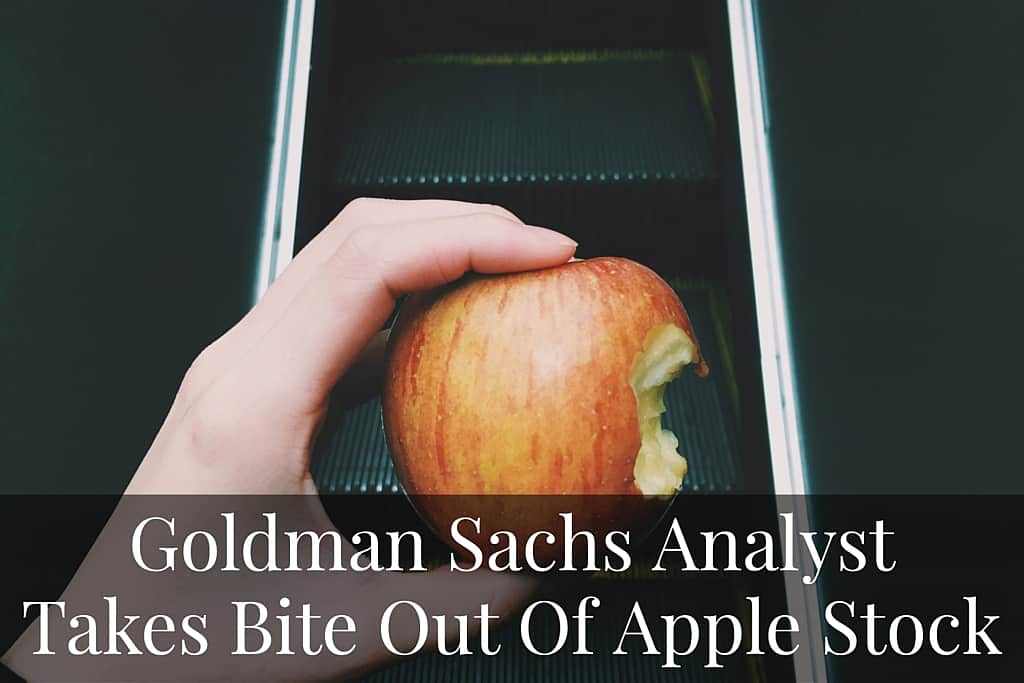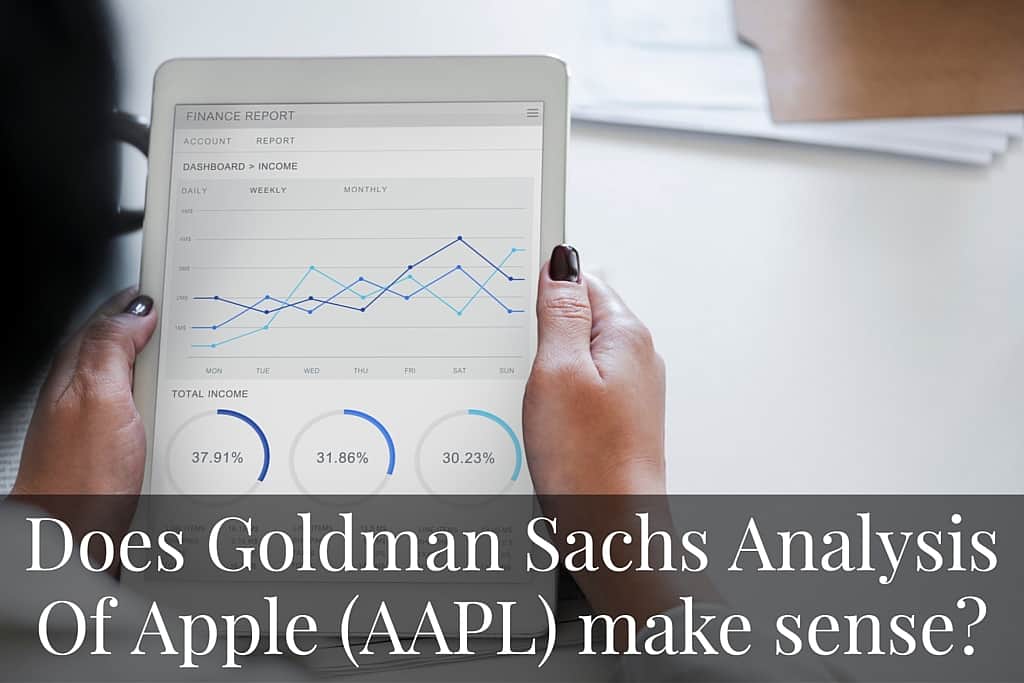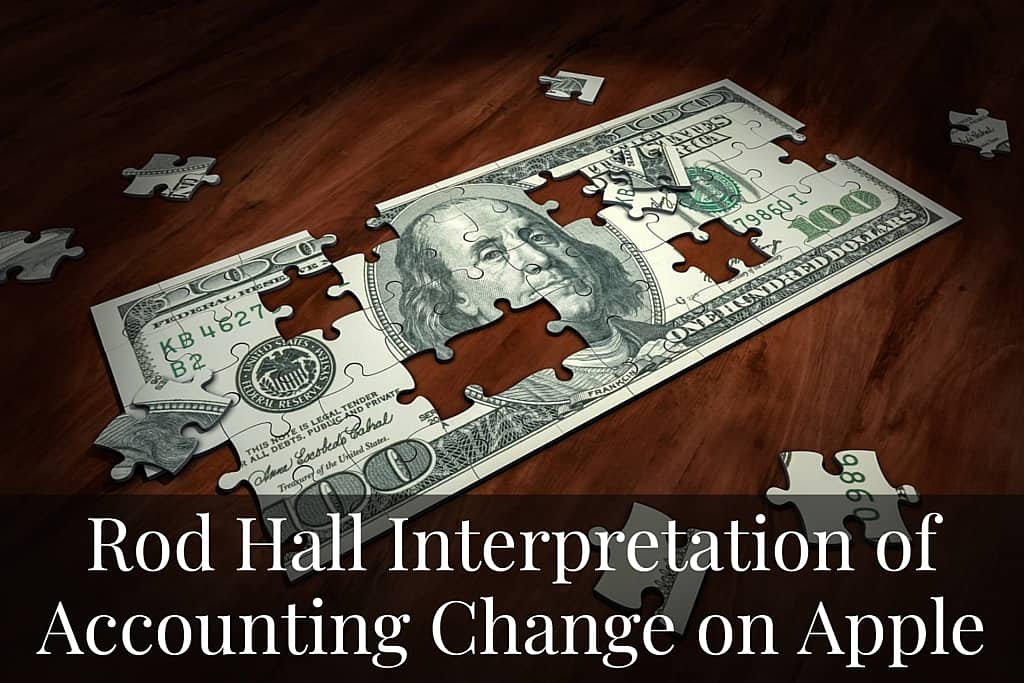The ultimate authority must always rest with the individual’s own reason and critical analysis.
Dalai Lama

Is Apple, one of the biggest companies in the world, rotten? Is Apple Stock Overvalued?
So implies Goldman Sachs Analyst, Rod Hall, who follows Apple stock and makes recommendations to buy, or most recently to sell[1].

Goldman Sachs analyst values Apple 25% below the current stock price
On September 13 Goldman Sachs Analyst, Rod Hall, unveiled a breathtaking announcement regarding the valuation of one of the largest companies in the world. Rod announced he was reducing his price target for Apple by 12% due to an adjustment of their accounting for a discount used to introduce the AppleTV+ service to customers.
Each share of Apple stock (AAPL) was trading at $220 at the open. Rod already had a significantly lower price target of $187 for a share of Apple’s stock. By reducing his price target from $187 to $165, Rod implies that Apple stock was trading 33% higher than where he believes the actual value should be.
Let me repeat that. Goldman Sachs analyst Rod Hall implies Apple stock overvalued by 33% (over his price target).

Is Apple stock overvalued? By 33%?
That’s a complicated question. Apple stock could be worth $165 based on pessimistic assumptions on the future of their earnings. But it could equally be valued at $275, or higher, based on other assumptions of Apple’s expected growth rate. Ultimately the value of every stock is based on whose assumptions about the future the participants in the stock market believes.
We don’t have a crystal ball. So we can’t evaluate Rod’s ability to foretell the future versus other analysts. But we can decide whether we believe Rod is a good analyst.
We know that Rod believes that the accounting change will have a 12% impact on the company. After all, he changed his target stock value from $187 to $165, a reduction of 12%.
Does Goldman Sachs analysis of Apple make sense?
Fortunately, we can factually evaluate what the impact of Apple accounting decision makes to Apple bottom line.
So let’s do that.

Some background on how we got to the accounting concern
On Monday, Apple revealed it would be launching its new AppleTV+ service, which is similar to Netflix or Hulu. It will start with the incredible price of $4.99 per month for the whole family. To introduce customers to this service, they also announced a free one-year trial for anyone buying a variety of new apple hardware (including the newly released iPhone).
Rod Hall figured out that this amounted to a $60 discount. He also figured out that Apple would be reducing its product revenues and increasing its services revenue. Apple services revenue accounting is different from its product revenue accounting. So the shift in product revenue to services revenue would affect the accounting for each product sale. They would defer what used to be $60 in upfront income from iPhone to services (AppleTV+). They would then recognize that income over 12 months instead of all up-front.
A simple example of the accounting change
A simple example might make Rod’s case more easily understood. Let’s use Rod’s example. He assumes you were buying a $1000 iPhone (rounding up from $999). Let me embellish his model by making a further assumption to make it even more evident. Let’s also assume this iPhone has a cost of $760 (just making it up for simplicity). Historically, when Apple sold that iPhone, they would show $240 of income in that quarter. That’s pretty straight forward.
With the new program, Apple would be providing to the customer $1060 of value (the $1000 iPhone and the $60 of AppleTV+ services) for $1000. That represents a discount of 5.7% (60/1060). Rod estimates that with the new accounting, Apple would show sales of AppleTV+ of $56.60 ($60 minus the 5.7% discount), but this would be accounted for monthly (or approximately $4.72 per month). And Apple would show sales of iPhone of $943.40. In the quarter when Apple sells an iPhone, Apple would now show $183.40 income from iPhone. They would also show another $4.72 per month in that quarter approximately (there will be some costs of AppleTV+, but let’s ignore them for now). If we assume Apple sells that phone at the beginning of the quarter, then the AppleTV+ income would be $14.16. Phone sales occur throughout the quarter, some near the beginning, some in the middle and some near the end. To be more accurate we should probably assume that the quarterly income for AppleTV+, on average, would be closer to $7.08 in that quarter.

Rod Hall interpretation of the accounting impact on Apple
So what have we? In this example, Apple used to announce $240 of income in the quarter in which it is selling the device, now finds itself in a position of being only able to record profit of $190.48 ($183.40 for iPhone and $7.08 for AppleTV+). That’s a whopping 21% drop in income in that quarter.
Well, Rod didn’t say 21% he said 12%. After all, I made up those cost numbers anyways. So, depending on Rod’s assumptions about the cost of the iPhone, it does look like Rod may be on to something. Right?
Rod has been telling us that Apple is way overvalued to begin. With a $187 price target, while the stock is trading at $220, he was among the lowest price targets. Before the new reduction, he implied that the market had overvalued Apple stock by 18% (220/187). Now if Rod is right, it does look like Apple’s income would decline by a significant chunk and the valuation should be adjusted accordingly.
Are Rod’s assumptions right?
Now that we understand Rod’s explanations and logic. Let’s turn to whether or not they make sense.
Let’s break down the problem into the economic logic and common sense.
That $60 discount does not represent profit loss with the new accounting. It merely shifts when and under which category income is earned and recorded.
So in the case above, while income in the quarter declined, income in later quarters increased. iPhone only generates income the quarter it sells the phone. No other income comes from selling that phone in the quarters following the sale.
With the new accounting shift, there will be additional income for multiple quarters. That is because the income shifted from the iPhone was moved to a service which shows income monthly. Some AppleTV+ service income counts in the same quarter as the phone sale, but the rest of the 60 dollars show up later.
What would be the real impact on Apple financial from this new program?
We can agree that for every qualified device sold, there’s a possibility of a $60 discount. Not all of those transactions will turn into actually used discounts. Only one discount is applied if you are buying multiple devices for your family. But let’s ignore that effect for now.
Here is what happens to the earnings each quarter as we apply the accounting changes for each discount.
| Quarter Device Sold | One Quarter Later | Two Quarters Later | Three Quarters Later | Four Quarters Later | Total For All | |
| Before | 60 | 0 | 0 | 0 | 0 | 60 |
| After | 7.5 | 15 | 15 | 15 | 7.5 | 60 |
| Net | -52.5 | 15 | 15 | 15 | 7.5 | 0 |
No matter how many devices sold or discounts taken, accounting has no effect on total income over a year. Yes, it does move things around and defers a lot from the first quarter, but the total income is the same at the end of a year.
Apple has a strategy of engineering and pricing new models to generate higher margins than previous products. It is very likely that those higher margins more than offset the impact of shifting earnings due to the accounting for its discount.
Some of you might get smart and conclude that the time value of money is critical and that the deferment of income means that the income of the after stream will by definition be lower. You would be right if that were consequential.
It’s not consequential because when we look at the time value of money, we should apply that to actual cash flow. And in this case, cash flow does not change from before to after. Apple still receives the same amount of cash up-front. The earnings accounting adjustments don’t affect cash-flow at all.

Bottom line, is Apple stock overvalued by 33%?
Nothing Apple announced suggests any need for any downward revision in the stock price. The opposite is more likely. If Apple can entice a substantial number of new AppleTv+ subscribers through this program to stay in the second year, then they will have added a significant boost to income next year. Twenty million subscribers mean approximately $100m in additional revenue per month. With services being lucrative and generating high margins, a lot of that will drop to the bottom-line.
I don’t know about you. To me, anyone with such a poor understanding of economics, accounting, and common sense are not credible or believable. Such an individual should not be in the business of financial valuation and stock recommendations. Some analysts don’t know what they are doing.
It’s even more troubling that this analyst is from Goldman Sachs, a reputed investment banking house. Let’s not forget that Goldman Sachs was the firm that just partnered with Apple to launch the Apple Card. If Goldman Sachs does not know more about Apple than the average investor, then who does?
Postscript 1 – Goldman Sachs Spin on the analysis
Current reporting says that this reevaluation reflected the analyst view that the stock market would misunderstand the accounting change. Goldman implied that the misunderstanding by the market would lead to a significant drop in the stock price.
I am not buying that explanation. That view contradicts the role of an analyst, which is to guide the market.
Postscript 2 – Apple statement on the accounting impact
“We do not expect the introduction of Apple TV+, including the accounting treatment for the service, to have a material impact on our financial results,”
NOTES:
- Rod Hall rates AAPL Stock a neutral, not a sell. However, with the stock trading 33% above Rod’s target of $165, it’s hard to explain the difference between his “neutral” and others “sell”.
Great analysis Leon, and you’ve proven one more time why Wall Street has become the biggest gambling casino in the world. Hate to say crooked but more and more it’s appearing that way.
Happy New year Dave. Sell-side analysts do not have any accountability for their recommendations or price targets. They are more likely to play to the latest trends rather than understanding inherent value. Once you know that, you are far ahead of the game and can actually win in this casino. Invest wisely!